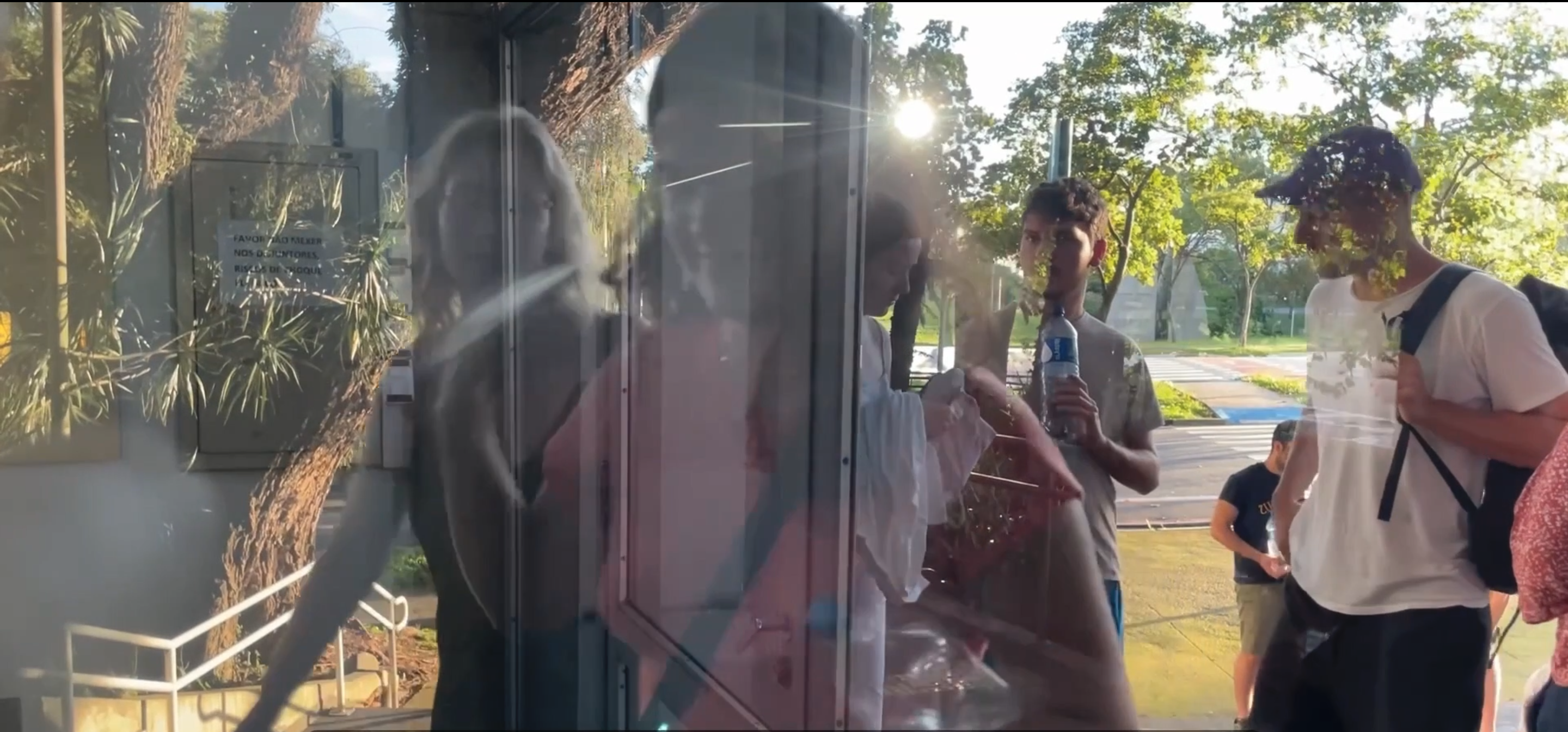The Portuguese-language proverb „Quem sai na chuva é para se molhar“ might be translated as „who goes out in the rain, wants to get wet.” It’s a reminder that actions have consequences, and if you choose to take a decision or face a situation, you should be prepared for the associated challenges and responsibilities.
The film Quem sain a chuva – so much to swimming
is a film by Nina Schäfer, Jule Heinzelmann & Paulina Schute
(hosted by the ZtG media repository at Humboldt-Universität zu Berlin)
Exchanges or Inside and Outside
During my student internship at the Institute of Advanced Studies at the University of São Paulo (IEA-USP), I worked on a film project named “Quem sai na chuva.” It focused on the subject of Planetary Health in urban areas and explored potential collaborations between researchers, students, and activists in Rio de Janeiro and São Paulo. The film grapples with the challenges surrounding collaboration, prompting reflection on linearity, causality, and the production of knowledge within academia.
A joint project, the film follows an excursion organized by Laura Kemmer and Sylvana Jahre, which included 30 students from the Geography Department of Humboldt-Universität zu Berlin. Through discussions with local partners in São Paulo and Rio de Janeiro, we engaged with discourses on the Right to the City and Planetary Health with the aim of deconstructing European self-perception and its entanglement with academia’s epistemology and methods.
Throughout the filmmaking process, we questioned our approach to producing knowledge and perspectives on discourses and concepts in order to try and address the (im-)possible exchange between academic and non-academic knowledge. Drawing on Stuart Hall’s insights, we aimed to recognize colonization as not only a system of domination but also a system of knowledge and representation. These intertwined components play a role in stabilizing the invention of the “Other.” As filmmakers, we concentrated on challenging the construction of the Other and disrupting linearity and causality in the film and project discussions. We propose viewing the film as a traveling assemblage and invite viewers to engage with it by (re-)connecting the suggested narratives via their own thoughts, images and emotions. This thus highlights the position of knowledge and narratives as actively chosen constructions.
The Situatedness of Knowledge
Architect and urban researcher Ana Nobre (working with the project Atlas do Chão) contributed to the film by giving an interview about the relation between one’s own position and the knowledge/worlds/maps that might enfold from there.
“When you map something you are not only selecting points, but you are also building relationships, relationships between the points, relationships between you and what you want to map. And you’re asking yourself where you are, who you are, and who you want to deliver the map to. And who you were building the map with.”
This highlights mapping, as well as knowledge and/or film production, as a constructive process characterized by both complexity and fluidity. “So mapping for me [Ana] is a way of also finding myself in this whole scenery.” (Source: Quem sai na chuva). In this sense, the production of knowledge transforms into a practice of flows and processes. Finding and situating oneself within this process becomes a continual procedure of (re)learning about one’s position, context, and the relationships within that.
As a traveling assemblage, the film project highlights the fluidity and complexity of perspectives within disrupted narratives. The project’s structure aims to challenge fixed divisions between text and context, fostering the visibility of the performative nature of knowledge and filmmaking. Interruptions and disruptions during the excursion and filmmaking process are translated into significant forms within the film. Notably, an interview with Nani Cruz (Central de Movimentos Populares) illustrates the (im-)possibility of cooperation and the performative nature of knowledge production.
Struggles and Translations
In the context of resistance and struggle for women’s rights and the right to be a woman on March 8, 2023, Nani Cruz emphasizes, in an interview[1] for the film, the intersection between structural racisms and housing in São Paulo und Brazil.
“’Senzala’ is on the factory floors. The ‘Senzala’ is still in the maid’s room, who left the ‘Senzala’ to continue her life as a maid. A job as a maid was the first job that an enslaved woman could get. She became a maid, a housekeeper. She left the ‘Senzala’ and as soon as people started to employ enslaved people, they began to let them into their houses as maids. So they changed only the name. This is where the problem with housing inequality begins, because when abolition (of slavery) came, everybody already had their big farms where they lived. So the Black people did what? They took their bundles. Nothing more. And without any document they could not do anything other than move up the hill. This is how the first favelas started to appear. So the housing question already started there. And today we continue to fight for housing in Sao Paulo und Brazil.”
The piece traveled among friends, colleagues, family, and lovers from Brazil, Berlin and elsewhere, all of whom engaged in conversations and debates about perceptions. Particular sequences unveiled complex (mis-)interpretations due to language, translation, societal positions, and expected connections. The phrase “[…] nada mais, sem lenço e sem documento […],” which we translated as “[…] Nothing more. And without any document […],” carries realities and meanings that we could not capture in the translation for the subtitles nor in the film itself. It was impossible to portray the way the phrase is situated in the social, emotional, and political contexts. In addition, the complex dimensions of the term “Senzala”, which describes a political and social position but also an architectural structure, remains a concept, an emotion, a strategy, and so on, due to multiple dynamics of power and oppression in the present and history remains untranslatable. As it is carried, discussed, and functional through a specific embedding and situatedness.
Our filmmaking decisions sculpted the presentation of knowledge, (re-)producing specific meanings and rendering certain realities visible or invisible. I warmly invite you to watch the film yourself, engaging from your own perspective to further disrupt, struggle with, or irritate the proposed connections and knowledge.
[1] English translation by Jule Heinzelmann, Paulina Schute, Henrique Barbosa, Lucas Morato, Robson, Laura Kemmer, et al., 2023.
Sources
Hall, S. (2002). Wann gab es ‚das Postkoloniale?‘: Denken an der Grenze. In: Sebastian Conrad/Shalini Randeria (eds), Jenseits des Eurozentrismus. Postkoloniale Perspektiven in den Geschichts- und Kulturwissenschaften, Frankfurt am Main/New York: Campus, pp. 219–246.
Nina Schäfer (she/her) is currently pursuing a Master’s in Gender Studies at Humboldt-Universität zu Berlin. Her recent film, Quem sain a chuva – so much to swimming, explores a collaboration between HU and Universidade de São Paulo on the subjects of Planetary Health, Environmental (In-)Justice, and Right to the City, and was funded by the DAAD PROMOS program. It was discussed at the conference Nature as Remedy: Studying Planetary Health between Berlin and São Paulo, in March 2023.

